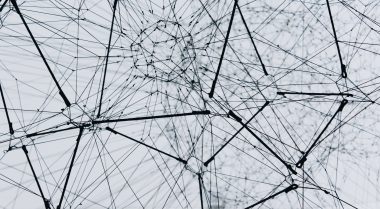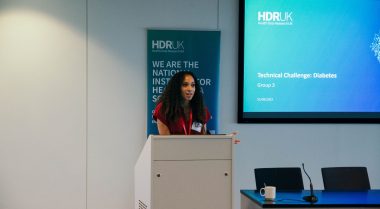Alumni Network: Outreach can help others like me
23 November 2023 | Author: Kazeem Bello, Intern at Cancer Research UK
Kazeem Bello was supported in his application for the Black Internship Programme by the Health Data Research UK (HDR UK) Alumni Network. He’s never looked back and says it was a turning point in his life. Now, he’s working with the network’s outreach initiatives, letting students like himself know about the health data research opportunities open to them.
What were you doing before the Black Internship Programme?
I was studying MSc in artificial intelligence (AI) and data science when I applied. Before that, I studied civil engineering.
What made you interested in health data science?
 The first insight I had into the impact of data science and artificial intelligence was during my final year, when I participated in a smart city design competition. While researching for the competition I got to understand how AI data science can be used in transportation engineering, for example, to improve mobility within a city.
The first insight I had into the impact of data science and artificial intelligence was during my final year, when I participated in a smart city design competition. While researching for the competition I got to understand how AI data science can be used in transportation engineering, for example, to improve mobility within a city.
I started learning to code and about data science. When I had the opportunity to come to the UK for my master’s, I chose artificial intelligence and data science.
However, before I was due to come here I became very ill and almost had to cancel everything. I feared I had a brain tumour and was going to die. It was a really tough time for me. And that was the moment I realised that I would like to work in healthcare and contribute my skills to the advancement of our health system.
How did you come across the HDR UK Alumni Network?
I was applying for the HDR UK Black Internship Programme last year. Because of my personal experience, I thought I would really like to be involved. It would be an opportunity not just to use my skills, but to use my skills to make healthcare better.
I wanted to know more about the programme so that I could prepare for the interview. I searched on LinkedIn and found a past intern who is from the Alumni Network. I reached out to him and we got talking. I asked about his experience on the programme and he told me a great deal that helped.
Who did you work with on the Black Internship Programme?
My hosts were Cancer Research UK. They got me working on this amazing project about machine learning and gene editing – the CRISPR Cas9 technology.
It was the turning point for me. I wanted to work in healthcare and to do things that would make a real difference. As soon as I got there and was told about the project, they said it would be making a direct contribution to saving lives. I never realised I would be able to have the opportunity to make a difference so soon.
That is one of the things that programme gives to you. And the chance to network with your peers and professionals in the field. For all these reasons I wanted to encourage people to apply – the opportunities are endless.
Is that why you got involved with the Alumni Network yourself?
Yes, and because when I went on the programme I found I was the only one from my university, but there were other universities which had quite a few people taking part. So, I wanted to help with the outreach work that the Alumni Network does – making sure that students get the information about these opportunities and giving them a better understanding of how they will help them to develop professionally and personally.
Where do you see your career going?
I just completed my master’s and I’m job hunting. My goal is to work in the healthcare space and to use my skills to better improve delivery and excellence.
One thing that interests me is that I have this idea for using machine learning to convert medical conversations into medical records. Medical professionals can spend 20% of their time filling in records and patient information. If we could automatically convert conversations into records, medical professionals could spend a lot more time caring for patients.



